Blog Post
Dutch Christian leaders receive death threats after signing Biblical sexual ethics statement
By Jonathon Van Maren
January 9, 2019 (LifeSiteNews) – A media firestorm has erupted in the Netherlands over the weekend after it was revealed that hundreds of Dutch Christian leaders had signed a statement reaffirming their belief in monogamous marriage between a man and a woman as well as biblical sexual ethics. Known as the Nashville Statement, the document had already garnered hundreds of thousands of signatures in the United States. Since the statement’s release, Dutch signatories have been harassed by both the media and individuals, and have even received death threats.
In August of 2017, Christian leaders in the United States released the Nashville Statement, a declaration reaffirming traditional Christian sexual ethics and their commitment to the 2,000-year-old belief that marriage is between one man and one woman. Over 22,000 leaders signed the declaration, and the Nashville Statement ended up being a line drawn in the sand for many liberal churches wavering between cultural currents and biblical doctrine. In a time of much confusion on issues of sexuality, the Nashville Statement brought clarity to the debate—and certainly clarified the positions of both those who decided to sign it and those who declined.
Throughout 2018, a translation of the Nashville Statement was circulated amongst ministers and theologians in the Netherlands, and eventually, over 250 Dutch pastors and church workers from Reformed denominations and various other Christian churches and organizations decided to sign it. Several current and emeritus (retired) pastors of the now largely-liberal Protestant Church of the Netherlands also signed it. In response, some congregations hoisted the rainbow flag and the clerk of this church’s general synod called the Statement “one-sided, closed, and irresponsible.” The primary purpose of the Dutch version of the Nashville Statement, however, was to provide clarity on current issues, as well as guidelines for truth and love within the Christian church.
Some did not perceive it that way. On Dec. 28, 2018, two theologians of the Theological University Apeldoorn posted an op-ed in the Reformed Daily newspaper outlining why they wouldn’t sign it prior to the document’s release, articulating their belief that the statement failed to display the necessary pastoral tone (especially for those struggling with their sexuality) and that it would cause division in an already divided church. As a result of the article in the Reformed Daily, there was pressure to release the statement along with the names of those who had signed it earlier than intended. The mainstream media picked up on the story and it promptly exploded, especially when it was revealed that the names of both the leader of the Reformed political party the SGP (and member of parliament) Kees van der Staaij as well as SGP senator Diederik van Dijk were among the signatories.
Dutch LGBT activists immediately went on the attack, condemning the statement as “hate.” The Public Prosecution Service is now looking into whether the statement breaks Dutch law, and pro-LGBT opera singer Francis van Broekhuizen has filed a police complaint against Kees van der Staaij, stating that the Nashville Statement is actually a “call [for] discriminating against [LGBT] people.” There have also been police reports of incitement to hatred made against van der Staaij, who noted initially that he was surprised to see his name on the document, as he had not been aware that it was going to be released. That being said, van der Staaij noted that the Statement did reflect his values, and he highlighted the postscript added by Dutch leaders, which reads as follows:
With the Dutch version of the Nashville declaration we want to confess what God’s Word affirms and deny what goes against God’s Word. At the same time we feel compelled to add a post-script, focused in on the pastoral, practical side.
Especially in light of the principles of this position statement, we confess guilt. As Christians in the Netherlands we have not always clearly and publicly spoken, especially not with one voice, and we are co-responsible for the confusion in our society. We also have not decorated our principles with the example of our lives. Christian marriages often have not showcased the image of how Christ treats His bride. Church leaders have sometimes sadly been co-responsible for covering up of (sexual) abuse. Position statements have not seldom resulted in abuse of power towards those who know of same-sex orientation. The pastoral care for members in our congregations in deep need has far too often been far too little.
This gives us, all the more, a greater responsibility for pastoral support and care. We need the mouth of a prophet, but also the heart of a shepherd. Those who recognize themselves in the description of same-sex attraction or struggle with their gender, may know that they certainly have a place in the Christian congregation. Nobody, after all, can pretend to have anything good of himself, but all must live by grace. Every heart by nature has a sinful orientation and every human knows sinful desires, which also manifest themselves in sexual ways. Fighting against sin therefore always means self-denial. This is a gift of God’s grace and is only possible through Christ and by the Holy Spirit. Jesus Christ has not come for the righteous but to call sinners to repentance and to save them.
This defines the Christian life. In this it is experienced that our identity is not in our sexuality, but in our relationship to Christ. This is in the knowledge that here on earth the greatest joy is found in a life according to God’s Word and in communion with Him, but also that this will only be in-part. The full victory over our sinful old nature is laid away for, when all true believers will eternally be with Christ. Then they are with body and soul fully devoted to Him and He will be all in all.
While the Netherlands is known as the birthplace of religious tolerance, it appears that this tolerance is not part of the new secular regime. “I’ve heard from young people today who say, ‘It seems as though you are allowed to do and think whatever you want in the Netherlands,” Kees van der Staaij told one TV interviewer, “except when you still confess traditional Christian values—then the world’s too small.’ Are you still allowed to be a Christian in this country, in the traditional, Christian way?”
It is strange to see that the post-Christian Netherlands has moved so far from its roots that it is considered both a revelation and a media scoop that Christian churches and Christian institutions hold to Christian values—and even stranger that the resulting outrage indicates that many Dutch politicians and activists are either discovering this for the first time or have decided to use this as an opportunity to bash those who disagree with them on sexuality. They have also revealed a disturbing refusal or inability to understand the arguments being presented, insisting that disagreement with certain behaviors constitutes hatred of certain people.
It appears that the Dutch media, as well as many politicians, LGBT activists, and even Christians, disregard entirely the idea that the Christian leaders they disagree with so strongly might actually believe in Christian doctrines: the existence of Heaven and Hell, as well as sin and salvation. If these leaders truly believe in these things, would it not, in fact, be hateful for them to simply tell those they believe to be living in sin that everything is fine? Christian leaders today have everything to gain by simply floating along with the cultural currents and avoiding controversy and backlash—but they believe that by doing that, they would be stating that the souls of men and women with same-sex attraction or gender dysphoria are not worth fighting for, and are not worth facing cultural persecution for.
READ THE REST OF THIS COLUMN AT LIFESITENEWS.COM








